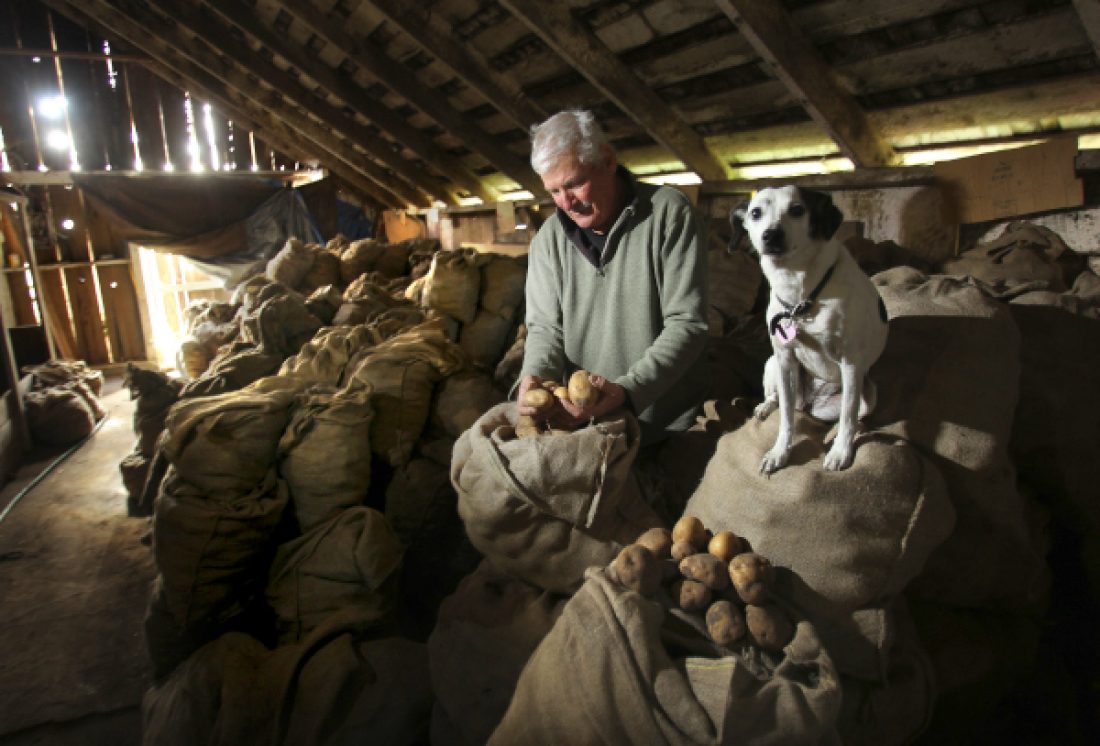By KATIE WATTS / Petaluma Towns Correspondent
It’s a warm, breezy morning in November. Fairies from thistle plants blow across the field just east of Tomales where organic farmer David Little is harvesting potatoes.
Little, 66, is a third-generation Marin County resident who fell in love with farming when he agreed to help a ranching friend. In 1995, he began farming potatoes – choosing the crop because the Tomales area was historically used to farm potatoes. He’s since expanded his fields to 50 acres and his crops to include strawberries, sunchokes, onions, lettuce, winter squash, mixed greens, broccoli, kale, chard and Romanesco cauliflower.
“These hills were once covered with farms,” Little says. “But post-World War II, there was a demand for cheaper food. Large-scale farming in the Central Valley boomed. But now, they’ve got water problems there.”
He doesn’t have problems with water – because he doesn’t use any. He practices dry farming.
Dry farming is a soil tillage technique, according to Little’s website, “an art of working the soil that creates better flavor and requires no irrigation. Starting as soon as possible in the spring, when the ground is still wet from winter rains, the ground is disked, disked again, plowed, then disked again with a roller, sealing the ground to hold in the moisture. This method creates a long window from the initial planting and allows the roots to become established.” Also, because he’s near the coast, his crops benefit from moisture brought by fog.
“When I first began,” Little says, “someone who worked for me said, ‘If you don’t cultivate, I’m not working with you.’” Little had no idea what that meant. “So I went to the local tavern and talked to the old guys down there. They passed on what they’d learned. One of them, who farmed on Pepper Road, told me he’d been doing it for 60 years and he was still learning.”
After 17 years of study, he says he’s an expert on the method although the process is always slightly experimental. Plants that don’t receive water are stressed. That adds character and flavor. But there are drawbacks, he points out. There’s less yield and less control. Produce develops a thicker skin to preserve more water. And often the fruits and vegetables may be more unsightly – “and pretty sells.”
Dry farming, he says, “is working with Mother Nature. It’s a series of observations and references.” He observes and records what works and what doesn’t. He pays attention to the microclimates on his rolling acreage of sandy loam and knows the subtle shadings and differences in the soil. And he’ll let nature guide him. “The best crops are always volunteer. They know what they’re doing.”
He talks about the benefits of what many may dismiss as an old wives’ tale – planting according to the phases of the moon. When the moon is waxing or full, he explains, the soil has more moisture, encouraging seeds to sprout. Although he knows it’s beneficial, he’s not always able to practice the method. Because he farms so much land, “I have to plant nearly every day.”
Farming isn’t for wimps, Little says. “There’s a reason people don’t want to farm. It’s a tough business. Oh it looks glamorous – from the outside. People see it and they get all kumbaya.
“Yes, you’re working with nature – but that has minuses as well as pluses. There are the highs and lows of farming. One day, I’ll look out at that cultivated land and it looks beautiful. The next, all I’ll see are weeds and gophers. It’s quite a roller coaster ride sometimes.”
He farms for quality: excellence, flavor and nutrition. After 17 years, he’s got a great reputation. What he grows is sought-after. “I like knowing I grow what are thought of as fine gourmet potatoes.” He also likes knowing that what his land produces helps feed the hungry: he donates food to five Bay Area charities. He jokes, “If you want my potatoes you can either go to the French Laundry – or the Healdsburg Food Pantry.”
In his previous life, Little was a roofing and siding contractor. And he, too, thought farming would be, as he says, “kumbaya.” By the time he found out it wasn’t it was too late: he was in love: with the country, the salt air and the pleasure he found working the ground.
“People don’t understand,” he says, “farming is hard work, and it’s full time. But, you almost have to do it to understand. If I had my druthers, I’d farm just 5 to 10 acres, for the fun of it, do a couple of farmers markets.”
After he worked his first farmers market in Berkeley, he swore to a fellow vendor, “I’m never doing this again.” The vendor laughed, and paraphrased the Terminator. “You’ll be back,” she told Little. And he was.
David Little’s produce is available at Whole Foods, the Marin farmers markets, San Francisco’s Ferry Plaza Market and the Berkeley Farmers Market. Check out his website at thelittleorganicfarm.com.

